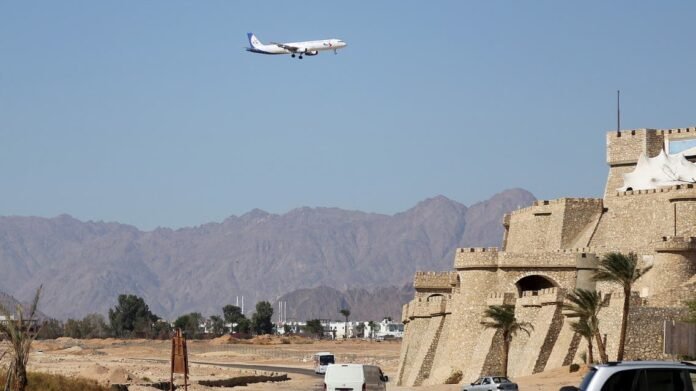Egypt is digging through the desert to create the largest artificial river in the northwest of the country, next to the Dabaa nuclear power plant, as part of its ‘New Delta’ project.
Professor of Water Resources and Irrigation, Abbas Sharaky, told RT that the agricultural activity in Egypt in recent years now extends to implement several major national projects, including a project to cultivate 1.5 million acres on non-renewable groundwater at 80 percent – most of which is in the Western Desert.
He added that the second project is the New Delta, west of Alexandria, to cultivate 2.2 million acres, depending on surface water from the Rashid branch of the Nile River, and agricultural drainage water after being treated through the artificial river, which will transfer water from al-Hammam plant, which is the largest treatment plant in the world, and part of the groundwater.
Sharaky continued: “The artificial river project is one of the most important water projects in recent years in terms of construction engineering and economic importance. It is a giant engineering work consisting of three channels that are constructed in different conditions from the rest of the irrigation channels in Egypt, as it transports water to desert areas that are more than 100 meters above the Nile River level.”
“The first channel is 42 km long, including 26 km of pipes, and 16 km of open channels to transport about 10 million cubic meters from the Rashid branch within the Mostakbal Egypt project,” he explained, adding that this, “represents the first phase of the grand project in the New Delta, with a total of about 3.5 billion cubic meters annually to irrigate about 600,000 acres, in addition to groundwater wells to irrigate 450,000 acres, with a total of 1.05 million acres, in which there are six large water pumping stations.”
“The second channel extends about 170 km from Hammam station to transfer seven million cubic meters/ day, with a total of about 2.5 billion cubic meters, to the south of Dabaa, to irrigate about 800,000 acres, of which 22 km are pipes with a length of 220 km and a diameter of thee meters, and 148 km of open canal, with 13 water pumping stations.”
“The third channel within the Jannat Masr (Egypt Paradise) project, which is two pipe lines with a length of 12 km, to irrigate about 64,000 acres, from the southern and western wastewater treatment plants in the 6th of October City, and the desalination of salty groundwater through 132 underground wells, and three water pumping stations,” he added.
He pointed out that the cost of the New Delta project amounts to LE 160 billion, and it contributes to bridging the food gap in cooperation with other agricultural projects.
Sharaky said that the biggest challenge now is to provide the necessary water as the Nile may not bear pumping the required amount of water given the fixed annual share is limited to 55.5 billion cubic meters, and the groundwater has high salinity.
In order to maximize the benefit from the artificial river, “we must focus on growing crops that thrive in the Egyptian desert lands with a high return for internal use or for export to pay part of the project cost,” he added.
Source: Egypt Independent

